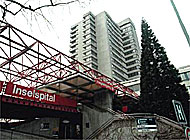Bern leads way in gene therapy for lung cancer

Bern's Inselspital is leading the way in cutting edge research on lung cancer treatment. It is one of two European centres testing a new gene-based therapy that should be available to the public by next spring.
The therapy was first developed at the University of Texas’ MD Anderson medical centre, and is being taking a step further in Bern and Barcelona.
Healthy cells are programmed to die naturally, but thoracic oncologists – lung cancer specialists – have noticed a common phenomenon in tumours: gene mutation.
Rather than dying, the mutant version of the p53 gene causes cells to divide and grow in unpredictable ways. When the cells are cancerous this has serious consequences for the patient.
The new therapy replaces mutant p53 with a healthy gene, which orders the cancerous cell to die. The research already carried out in Texas has been effective, with the growth of tumours at least interrupted in up to 50 per cent of cases.
Although the developing therapy does not appear to have any side effects, such as those associated with radio- and chemotherapy, concerns remain that the replacement gene could also kill healthy cells around the tumour.
Bern’s Inselspital is a recognised centre of excellence in cancer research. The hospital’s team, led by Dr Ralph Schmid, is focusing on new ways to administer the gene therapy, hoping to replace direct injections into the tumour with an intravenous method.
From next year, lung cancer patients will receive the therapy, although it will be combined be more traditional methods. “Cancer treatment normally starts with surgery, at least in the initial phase, then proceeds to radiation and chemotherapy,” says Schmid.
“But this new micro-biological, or gene-based, research, is the most interesting future direction for treatment. I believe all therapies will eventually focus on genes.”
Schmid says that the Swiss are some of Europe’s leading lung cancer sufferers. “It’s now one of the biggest killers of men, and unfortunately women are catching up quickly.”
The disease’s most well known cause is smoking. Schmid says other factors are virtually negligible.
“A hundred years ago hardly anyone suffered from lung cancer. But as the number of smokers rose during the century, lung cancer cases did likewise.”
The proportion of smokers in Switzerland is not as high as in countries like Spain and Italy, but is still significant. While the number was in decline, the latest trends show more and more young people smoke.
“Over half of 15 to 20 year-olds in Switzerland are smokers,” says Schmid. “The best way to prevent lung cancer is to stop smoking, or not to start in the first place, but once someone has the disease we need to find new ways to deal with it.”
“Because, in the next five years, we’re going to see a boom in new gene-based treatments, this will mean that in the future there will be a lot more hope for cancer patients to survive.”
by Jonathan Fowler

In compliance with the JTI standards
More: SWI swissinfo.ch certified by the Journalism Trust Initiative
You can find an overview of ongoing debates with our journalists here . Please join us!
If you want to start a conversation about a topic raised in this article or want to report factual errors, email us at english@swissinfo.ch.